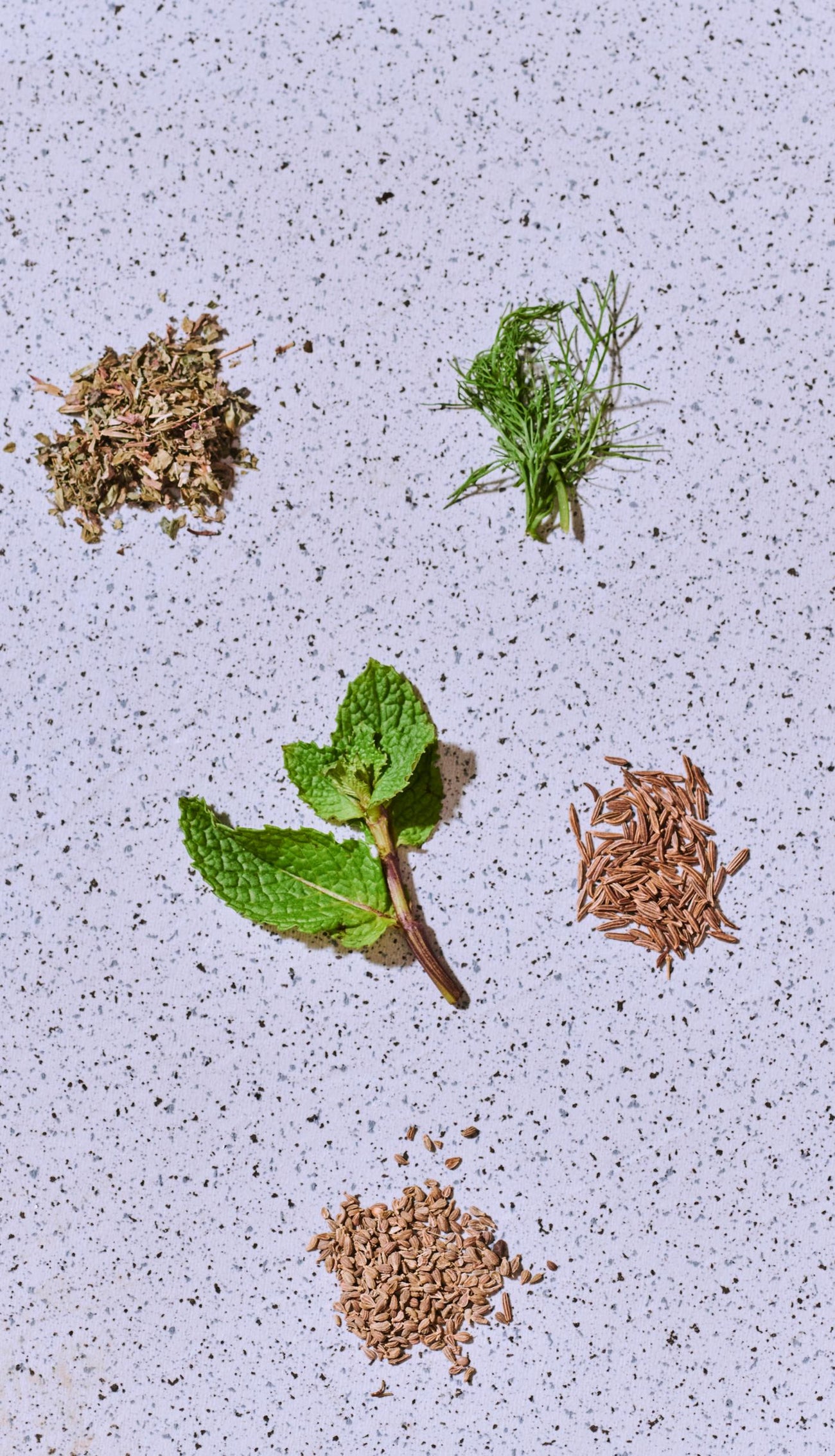
Even the strongest stomachs among us sometimes deal with gas, diarrhea, constipation, and bloating. It could be something we ate, how fast we ate it, our periods — who knows. Even regular stress can throw digestion off, and let’s face it, we’re all pretty stressed these days.
Enter your secret weapon: carminative herbs. These natural powerhouses are renowned for their ability to soothe the digestive system and relieve discomfort. Read on to get the scoop on how carminative herbs work their magic in calming your digestive system and the best ones to integrate into your routine for optimal gut health.
First Things First — What Are Carminatives Anyway?
Carminatives are, simply put, natural gas relievers. Their power lies in their volatile oils, which are the part of a plant that often gives it its scent and also the part extracted to produce essential oils. Carminatives show up in the spice aisle, in beauty products, in teas, and in supplements.
How Do Carminatives Ease Digestion?
So, how exactly do carminatives work? In short, they promote the release of gas from the stomach and intestines, which helps to soothe discomfort and reduce bloating. The essential oils found in these herbs relax the digestive tract, easing the passage of gas and supporting overall digestive function.
The gentle, soothing action of carminatives makes them a favorite for naturally enhancing the body's digestive capabilities and promoting a feeling of stomach comfort.
Top 10 Carminative Herbs and Their Benefits
Now that we've covered the basics of carminative herbs, let's look at 10 standout examples and the benefits they offer for digestive health:
1. Lemon Balm
You wouldn't know it from its name, but lemon balm is actually part of the mint family. Native to the Mediterranean it's also called Melissa, the Greek word for honey bee — because honey bees love it. No wonder — lemon balm has been a part of herbal medicine dating since 60 A.D. in Ancient Greece, when it was used for fever relief, gas relief, and even in “magic spells” for healing broken hearts and attracting love.
No matter what brings on your digestive issues, lemon balm may calm GI discomfort, but it's been shown in clinical studies to be especially effective when that discomfort is triggered by stress, like a nervous stomach before a big presentation. Research has found it also relieves period cramps, stress-induced headaches, insomnia, and anxiety, and boosts cognitive function.
2. Fennel
Fennel's rich history goes way back — it was used by ancient Egyptians as a food and medicine, in ancient China for snake bites, and in the Middle Ages to ward away evil spirits. And in Ancient Athens, Pheidippides carried a fennel stalk for 150 miles over his two-day run to Sparta. You don't have to bring fennel along on your next jog to get its benefits, though. The seeds and stalk can both be eaten, and the oil is added to everything from drinks to baked goods.
Fennel benefits those with ongoing stomach conditions like Irritable Bowel Syndrome, since they help relieve gas, bloating, constipation, and diarrhea. It acts as an antispasmodic in the colon to reduce bloating, and also relaxes the smooth muscles of the digestive system to stimulate bile flow and reduce pain during digestion.
3. Peppermint Leaf
As we all know, Peppermint Leaf is used to flavor mints and toothpaste. It has actually been used for thousands of years for its minty taste. It's part of the Mentha species, named after Minthe from Roman Mythology, turned into a plant by the jealous Persephone. Its use goes back a long way — dried peppermint leaves were found in ancient tombs in Egypt, and it first appeared in pharmacy documentation in 1721.
Its secret ingredient is the high naturally occurring concentration of the essential oil menthol, which is delivered in an enteric coasted capsule. This has antispasmodic properties, relaxing the intestinal smooth muscle and causing the pain-sensing fibers in the gut to become temporarily less sensitive. In clinical studies, it has also been shown to reduce bloating.
4. Ginger
Ginger, the zesty root that wakes up any dish, has been sparking joy in kitchens and medicine cabinets alike for over 5,000 years. Native to Southeast Asia, ginger is as much a staple in herbal teas as it is in spicy stir-fries.
Beyond its bold flavor, ginger shines when it comes to settling stomachs and enhancing digestive health. Its natural compounds can help speed up the emptying of the stomach, soothing bloating and discomfort often associated with slow digestion.
For anyone feeling a bit queasy or looking to support their digestive wellness, a slice of ginger could be the golden ticket. It’s also revered for its role in supporting immune health, making it a powerhouse for both the gut and overall well being.
5. Chamomile
Chamomile might just be the closest thing to a cuddle in plant form. With its soft, apple-like fragrance and thousands of years of medicinal use, chamomile is a gentle giant in the world of herbal remedies. Celebrated not just for its ability to promote calm and sleep, this daisy-like plant also works wonders on an upset stomach.
Particularly effective in managing indigestion and the discomforts of IBS, chamomile’s soothing properties calm the digestive tract and help dissipate gas, making it a favorite for those needing a mild, natural way to ease the belly and the mind. Whether you're winding down for the evening or need a stress reliever, chamomile is your go-to herb for peace and digestion.
6. Turmeric
Turmeric, the vibrant golden spice, is a cornerstone of traditional herbal medicine. Not only is it celebrated for its ability to add depth and color to dishes but turmeric has plenty of health benefits and healing properties. This spice contains curcumin, a compound that supports the digestive process by stimulating bile production, which helps in breaking down fats.
Turmeric also promotes a soothing effect on the intestinal walls, which can alleviate symptoms of bloating and gas. Regular inclusion of turmeric in your diet, perhaps as a tea or in your favorite curry, can support overall digestive health and add a burst of color and flavor to your meals. Additionally, its antioxidant properties contribute to overall wellness, making it a valued addition to any health-conscious kitchen.
7. Cardamom
Cardamom, often hailed as the queen of spices, brings a touch of exotic warmth and sweetness to any culinary concoction. But its prowess extends beyond the kitchen; cardamom is a potent digestive aid. This aromatic spice is cherished in traditional medicine for its ability to alleviate symptoms like heartburn and indigestion.
Its essential oils can soothe the stomach lining and promote the efficient movement of food through the digestive tract, soothing discomfort like gas and bloating. Whether you're savoring a cup of chai or tackling a heavy meal, incorporating cardamom can enhance digestive wellness while infusing your dishes with its distinctive flavor.
8. Cumin
Cumin seeds pack a powerful punch not only with their distinct, earthy flavor but also as a champion of digestive health. This spice, a staple in many global cuisines, especially Indian, Middle Eastern, and Mexican, has been used traditionally to improve digestion and reduce symptoms of indigestion and flatulence.
The active ingredients in cumin seeds stimulate the secretion of pancreatic enzymes, which are crucial for efficient digestion and nutrient absorption. Adding cumin to your meals not only enhances their flavor profile but also helps maintain a comfortable digestive experience, making it easier to enjoy your food without worry.
9. Coriander
Coriander, with its lemony citrus overtones, offers more than just a fresh burst of flavor to dishes around the world. This versatile herb, from the fresh leaves to the dried seeds, plays an important role in gut health. Coriander seeds, in particular, are known for their ability to alleviate bloating and discomfort due to their carminative properties, which help relax the digestive muscles and enhance gut motility.
Including coriander in your cooking can be a delightful way to support your digestive system while adding a touch of zest to your culinary creations. Whether it’s in a salsa, curry, or a soothing tea, coriander is a must-have for both its health benefits and its flavor enhancement.
10. Cinnamon
And last but not least, cinnamon, a spice that's as beloved for its comforting warmth as it is respected for its health benefits. Cinnamon is not just a staple in baking and cooking; it also offers notable health advantages.
This aromatic spice is known for its ability to reduce discomfort associated with indigestion and can help manage blood sugar levels, which indirectly benefits gut health. Its natural oil component, cinnamaldehyde, helps relax the digestive system and can soothe bloating and gas. Infuse your morning oatmeal, your favorite coffee, or an evening tea with a dash of cinnamon to enjoy its sweet spice and supportive digestive properties.
How Do I Integrate Carminative Herbs Into My Routine?
You've got the scoop on some carminative herbs, but how do you incorporate them into your routine?
Here are a few go-to tips that can guide you:
Herbal Tea Time
Make herbal teas part of your daily ritual. Whether it’s a cup of chamomile to unwind at night or peppermint to soothe your stomach after meals, these teas are simple, effective ways to enjoy the benefits of carminatives.
Spice It Up
Incorporate spices like cinnamon, cardamom, and coriander into your cooking. These aren't just flavorful additions — they actively support your digestive system by helping break down foods more efficiently and easing digestion.
Convenient Supplements
For targeted support, consider incorporating supplements like our Gas + Bloat Relief, which blends carminative herbs such as peppermint and lemon balm. This is a practical way to manage digestive discomfort wherever you are.
Infused Waters
Tossing in slices of ginger or a sprinkle of turmeric to your water bottle can transform your hydration into a digestive aid. It’s refreshing and subtly supports digestion throughout your day.
Seasonal Cooking
Use carminative herbs and spices in seasonal recipes to support digestion year-round. Adding turmeric to winter soups or summer smoothies can boost both the flavor and function of your meals.
Daily Digestive Support
Opt for science-backed remedies like our Daily Pre + Probiotic + Herbs to maintain a balanced digestive system. This supplement combines gut-soothing herbs with probiotics, enhancing your daily wellness routine.
Embrace the Power of Carminative Herbs
So, what are carminative herbs? They're nature's way of bringing comfort to your digestive system. These potent herbs, from chamomile to cinnamon, are not just about adding flavor to your meals — they're about enhancing your digestive health and overall well-being.
At Hilma, we harness the power of these natural wonders to offer you products that support a balanced digestive system, so you can feel your best every day. Explore our range and discover the perfect blend to nurture your gut health.
Trust Hilma to turn natural ingredients into your daily dose of digestive comfort. Try us out and feel the difference!
To learn more about essential oils and how they affect your gut, check out this article.
Sources:
- The Naturopathic Herbalist
- Mind Body Green
- Our Herb Garden
- GI Society
- The Amazing and Mighty Ginger - Herbal Medicine | NCBI Bookshelf
- Chamomile: A Review of Its Traditional Uses | PMC
- Cardamom, Small Cardamom, Green Cardamom | University of Wisconsin-Stevens Point
- Turmeric, the Golden Spice - Herbal Medicine | NCBI Bookshelf
- From Ancient Sumeria To Chipotle Tacos, Cumin Has Spiced Up The World | NPR
- Cinnamon: Mystic powers of a minute ingredient | PMC
- Coriander - an overview | ScienceDirect Topics



